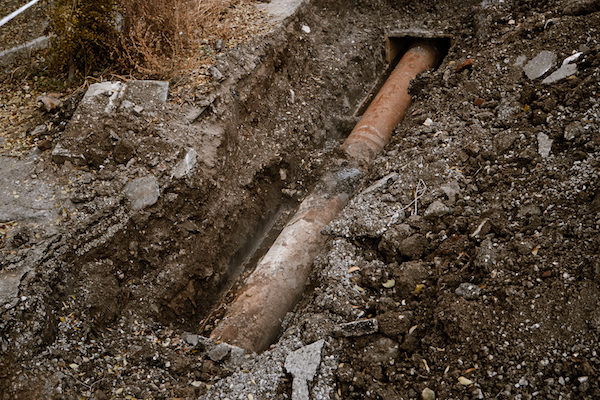Every time you flush the toilet, use a drain or sink, and shower, wastewater flows through your home’s sewer line to the main line or your septic tank. Over time, though, this line can experience damage from many different factors. Knowing what can cause this damage can help you understand gurgling sounds, indentations in the lawn, and sewage odors from your drains.
Tree Roots
One of the leading causes of clogged and collapsed sewer systems is tree roots. In search of water, oxygen, and nutrients, the roots penetrate even the tiniest cracks in old or damaged pipes. Once inside, the roots can wreak havoc on the pipes by growing and expanding, eventually causing a full-blown clog. If the clog is severe enough, the pipes may rupture. It’s a serious problem that needs to be addressed right away by a qualified plumber. Fortunately, you can take steps to prevent tree root intrusion in your sewer line. Start by regularly checking the drains in your home. If a specific fixture drains slowly, check the plumbing of other fixtures to see if the problem is isolated. Call a trusted plumbing company that handles sewer repair service and maintenance of all your household drains that are slowing or making gurgling sounds.
When designing your yard, choose low-growing trees that won’t send invading roots into your pipes. If you have existing trees, talk to your local nursery about non-aggressive species that can thrive in your climate. If you must plant a new tree, be sure it’s at least 30 feet from your sewer line. It’s best to avoid planting any trees within 100 feet of the line.
Clogs
Getting a clog in your sewer line can lead to sewage back-ups, which are messy and dangerous. It can also damage your home’s plumbing, requiring costly repairs. A professional plumber can quickly and easily clear clogs in your sewer lines. Clogs are typically caused by items that are flushed down toilets or drains, such as baby wipes, grease, and other debris. The best way to prevent this is by avoiding flushing trash down your toilets and not disposing of grease in your drains. Grease may seem safe to throw in the pipes, but when it solidifies, it can clog your entire plumbing system.
Another common cause of clogs is broken or damaged pipes. It can occur due to corrosion, soil movement, or extreme weather conditions. When a pipe breaks, it can let in leaves, dirt, and other debris, leading to clogs and sewage back-ups. Although repairing broken pipes can be difficult, a professional plumber has the equipment and know-how to do it quickly. Some signs that you have a broken sewer line include slow-draining toilets, gurgling sounds when a toilet is flushed, and sewage odors. As soon as you become aware of any of these problems, you must contact a plumber so they can examine and fix the pipe before it bursts entirely.
Broken Pipes
The sewer line is a vital part of your home’s plumbing system, but over time, it can become damaged by many things. For example, the ground can settle and crush pipes, or thirsty tree roots can invade and cause damage. If you notice any of these problems, it’s a sign that your sewer line is broken or needs repair. The most obvious symptom of a broken sewer line is sewage back-ups. It is a clear sign that the line has a crack or hole, which could lead to a complete collapse if left unchecked.
Another common symptom is water that appears to be muddy brown. It can be caused by corrosion in the pipe that carries wastewater and sewage, which deposits minerals into the water. The best solution is to call a plumber for professional help right away. Gurgling sounds emanating from your toilets or drains are another sign that the line is clogged or fractured. The sooner you fix it, the better, as a clog will only worsen. Putting non-degradable items down your drains can also damage the sewer line. Grease, feminine hygiene products, and baby wipes should not be poured or flushed down the drain because they can clog it. Grease can also build up in the pipes, solidifying when it cools.
Heavy Traffic
Like all plumbing systems, sewer lines aren’t immune to cracking and breaking. Many factors can damage the pipes, including ground shifts or settling, heavy vehicle traffic above the line, or rusting and breaking down old pipe material. Plumbing problems in your house, like sewage backup in showers and toilets, may result from these problems. The most common problem with sewer lines is clogs. Eggshells, grease, and other items that aren’t water-soluble can stick to joints and cracks in the pipes and create blockages over time. A sudden spike in wastewater flow can also overwhelm a line and cause it to break or collapse.
Another significant issue is tree roots. The roots can latch onto and penetrate sewer lines as they search for moisture. When this happens, the roots can encroach on and damage the pipe’s inside, leading to a break or complete clog. If you’re considering buying an older house, ask about the condition of the sewer pipes. Older houses often have cast iron or clay pipes susceptible to collapse and other problems. The type of piping installed in the home and any potential maintenance issues can be determined by a professional plumber using an inspection camera. Proper repairs can help protect your investment and prevent costly future damage.
